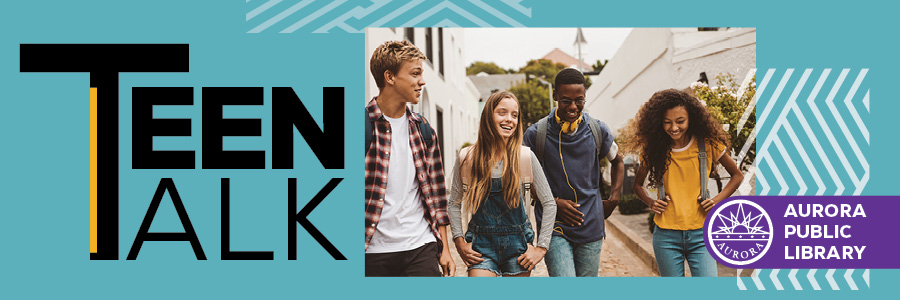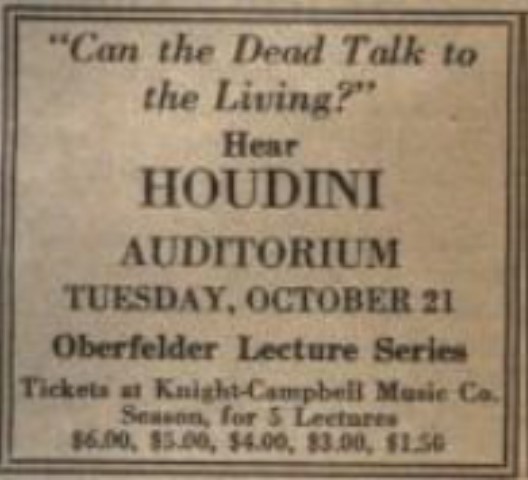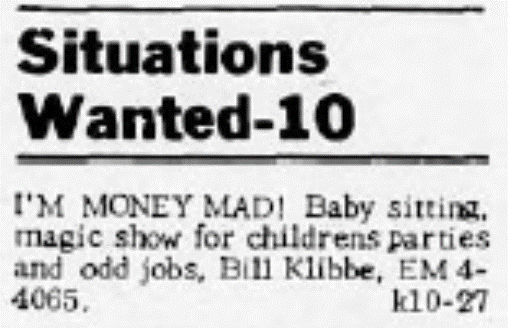Welcome to Aurora Public Library’s blog. A place where our library staff share their thoughts, insider knowledge and overall love of all things book and community.
Feel free to comment on posts, re-blog and enjoy. To ensure a civil and focused discussion, comments will be held for a brief period before being published.

Hey teens, let’s talk! :)
I'm Taylor, one of the Youth Services librarians over at Central Library.

Each month at the Aurora Public Library, I cover a variety of topics for teens. This month’s blog is all about mental health.
Swing by the Aurora Central Library's teen area to browse books, resources, and/or activities related to the monthly topic.

What is Mental Health?
Mental health refers to our cognitive, behavioral, and emotional well-being. In simpler terms, mental health affects how we think, behave, and feel—which then can affect our daily lives, relationships, and physical health. Conditions such as stress, anxiety, depression, and addiction (as a few examples), can turn a person’s daily life upside down.
Read more here: MedicalNewsToday.com

According to the World Health Organization (WHO), “Mental health is a state of well-being in which an individual realizes his or her own abilities, can cope with the normal stresses of life, can work productively, and is able to make a contribution to his or her community.” The WHO stress that mental health is “more than just the absence of mental disorders or disabilities.” Peak mental health is about not only avoiding active conditions but also looking after ongoing wellness and happiness.
The 10 Tools for Living Mentally Healthy:
1. Connect with others
2. Stay positive
3. Get physically active
4. Help others
5. Get enough Sleep
6. Create joy and satisfaction
7. Eat well
8. Take care of your spirit
9. Deal better with hard times
10. Get professional help if you need it
Read more about how to incorporate these practices into your life here: MHANational.org/ten-tools

Never forget: Your mental health MATTERS.
Read more:
Explore books & eContent regarding mental health:
Resources are also available at Aurora Mental Health.
Check back next month for our next Teen Talk!
Come join me every Thursday at 4 p.m. for our weekly Teen Hang at the Aurora Central Library. I'd love to meet you and hear about what topics you’d like featured.

-Taylor (she/her)

Hey teens, let’s talk! J
I'm Taylor, one of the Youth Services librarians at Aurora Central Library.

Each month at the Aurora Public Library, I cover a variety of topics for teens. This month’s blog is all about sexual health.
Swing by the Aurora Central Library's teen area to browse books, resources and activities related to the monthly topic.

April is STD (Sexually Transmitted Diseases) Awareness Month! I didn’t know this, but it seems so fitting given that this month’s blog post is all about sexual health. Let me begin by saying sexual health is not only about preventing STDs — it encompasses a whole range of topics related to your changing body, sexual relationships and overall health.
Some of the things you will read in this blog post may be new to you, lead you to feel uncomfortable or awkward and have you asking more questions than you did before — and that is all okay! It’s normal. You are not alone in your feelings. This is a safe space.
Real talk: Growing up I did not have access to a lot of information regarding my sexual health. This left me feeling a sense of personal shame, confused and even stupid at times. It also affected my physical health, leading to a handful of STDs as well as an unplanned pregnancy. I hope this blog post will help you feel more informed regarding your health as well as capable of having a conversation with a trusted adult if you need more information and questions answered.

• KidsHealth.org has one of the most comprehensive lists I’ve seen regarding adolescent and teen sexual health. I’d highly recommend exploring this page to get some of your (potentially embarrassing) questions answered.
• Sex, etc. has a sex ed dictionary with almost 400 words you need to know. - https://sexetc.org/sex-ed/sex-terms/
Puberty
Puberty is a time of emotional and physical change. You can feel out of control and confused at what is happening inside of you. However uncomfortable, awkward and scary it may be these feelings will not last forever and are all part of normal growth and development.

Resources about Puberty
· Puberty Topics (Videos)
· Everything You Wanted to Know About Puberty
· Puberty & Development Information
· Puberty 101
Masturbation
"What is it about masturbation that provokes such negative reactions from so many people? Shame, silence and stigma are common adult reactions to the topic.
Yet, the topic of masturbation is consistently mentioned in all the groups of students with whom I’ve worked. Students often ask if it is okay. Silence from adults communicates stigma to our young people: masturbation is shameful and taboo. So, young people learn not to talk about it. They hide their questions and behavior from the adults who love and care for them. Our children develop unhealthy attitudes about the ways their bodies work and feel during puberty.
[I]t is normal if someone does masturbate, and it is also normal if someone does not masturbate. Whether or not a person masturbates is an individual choice” (Wendy Sellers, 2016).
Masturbation: Totally Normal (Video)
Healthy Relationships

· Healthy Relationships
· 6 Simple Ways to Understand Consent (Video)
· Consent: What Does it Mean?
· How to Tell Your Partner What You’re Ready (or Not Ready) for Sexually
STDs (Sexually Transmitted Diseases)
STDs come with a lot of stigma and shame… Why? Despite what you may think, more people have had an STD at some point in their life than not.
While a handful of STDs are not a big deal if treated (usually just an antibiotic for a couple weeks), if left untreated they can severely impact your life. That is why it is important to get tested regularly if you are sexually active and communicate with any sexual partners you have.
· Free, Safe, & Confidential Testing
· Do You Have an STD? You're Not the Only One
· How To Tell Someone That You Have an STD or STI
· 10 Signs You May Have an STD or STI
· How Do Teen Couples Talk About STDs?
Pregnancy
Unplanned pregnancy can be scary and overwhelming. There are three options: raising the child, having an abortion or placing the child for adoption. It is important remember that there is no “right” option, each one is a choice — a hard one, but still yours to make.
· Pregnant?
· Experiencing an Unplanned Pregnancy? You have options.
· The Adoption Option
· Birth Mothers Share What They Want Adoptive Parents to Know
Birth Control

What’s the Best Birth Control for Teens?
***The most effective way to prevent pregnancy and STDs is by practicing abstinence -- meaning not having sex or any intimate genital contact (including anal sex or oral sex).***
Explore books & eContent regarding sexual health:
Check back next month for our next Teen Talk!
Come join me every Thursday at 4 p.m. for our weekly Teen Hang at Aurora Central Library. I'd love to meet you and hear about what topics you’d like featured.

-Taylor (she/her)

Hey teens, let’s talk!
I'm Taylor, one of the Youth Services librarians at Aurora Central Library.

Each month at the Aurora Public Library, I cover a variety of topics for teens. This month’s blog on mindfulness.
Swing by the Aurora Central Library's teen area to browse books, resources, and activities related to the monthly topic.

Mindfulness and meditation have become buzzwords over the last few years and for good reason—it works, it’s free, it’s simple, and anyone can do it. The COVID-19 pandemic has affected us all and altered the way we do life. Slowing down and remaining present is now more essential than ever to our overall well-being.
Let’s dive in — what is mindfulness?
“Mindfulness means maintaining a moment-by-moment awareness of our thoughts, feelings, bodily sensations, and surrounding environment, through a gentle, nurturing lens.
Mindfulness also involves acceptance, meaning that we pay attention to our thoughts and feelings without judging them—without believing, for instance, that there’s a “right” or “wrong” way to think or feel in a given moment.
When we practice mindfulness, our thoughts tune into what we’re sensing in the present moment rather than rehashing the past or imagining the future.” (Source: Greater Good Magazine)

Read these articles about the power of mindfulness in daily life:
- How I Became a Mindfulness Convert
- Benefits of Mindfulness
- How to Practice Mindfulness: 11 Practical Steps and Tips

I only recently got into meditation and mindfulness. I had heard a lot about the practice. I had heard about the benefits, but I still was resistant. It felt too easy or like it wouldn’t make much of a difference. About eight months ago I started incorporating deep breathing meditation before bed to help with my insomnia. I would play some ocean sounds or thunderstorms on my phone and practice deep breathing for twenty minutes while lying in bed. The results were instant and long-lasting.
Since then, whenever I have started to feel overwhelmed or anxious I’ll try to remember to step aside and take a couple of deep breathes to re-center myself. I can feel my body relaxing and the tension leaving after a few breathes. It’s amazing!
Three months ago I started reading up on mindfulness. I was surprised to find how simple and transformative the practice was. It sounds so simple—pay attention to the present moment, pay attention to how you feel, your surroundings, etc.
The area of my life where I was able to see immediate changes was with eating. When practicing mindful eating you have no distractions, savor each bite, and fully engage with the act of eating and the food in front of you.
What is most important about mindfulness is that you don’t have to be perfect and it is something that you continue to practice and grow with. I hope that you will consider incorporating mindfulness into your daily life and giving meditation a try. I have found it to be more beneficial than I thought.

Explore these free apps for guided meditations and mindfulness practices:
- Smiling Mind – FREE app
- Insight Timer – FREE app (pay for more access)
Check out these books related to mindfulness and meditation:
Check back in April for our next Teen Talk!
Join me every Thursday at 4 p.m. for our weekly Teen Hang at Aurora Central Library (14949 E. Alameda Pkwy.). I'd love to meet you and hear about what topics you’d like featured.


Hey teens, let’s talk!
I'm Taylor, one of the Youth Services librarians at Aurora Central Library.

Each month at the Aurora Public Library, I cover a variety of topics for teens. This month’s blog is all about self-love.
Swing by the Aurora Central Library's teen area to browse books, resources, and activities related to the monthly topic.

Self-love. We hear this term quite frequently nowadays, but… What does it really mean? How do we cultivate it? Why is it important?
Self-love: “regard for one's own well-being and happiness” –Oxford Dictionary

Self-Love and What It Means:
“Self-love is a state of appreciation for oneself that grows from actions that support our physical, psychological and spiritual
growth. Self-love means having a high regard for your own well-being and happiness. Self-love means taking care of
your own needs and not sacrificing your well-being to please others. Self-love means not settling for less than you deserve.”
The line that really sticks out to me in this definition is: “Self-love means taking care of your own needs and not sacrificing your well-being to please others.”
I struggle a lot with ignoring my own needs in order to remain “responsible, productive, or a good friend/partner” when it actually is hurting me and hinders my ability to show up for my friends, family and coworkers. It is easy to push, push, push and think we are doing what is right. However, our bodies and minds will find ways to slow us down and stop us if we are not paying attention to our needs. Practicing self-love and learning what you need is difficult and does not happen overnight. Remember to give yourself some grace and trust yourself.
Examples of self-love:
• Talking to and about yourself with love
• Prioritizing yourself
• Giving yourself a break from self-judgement
• Trusting yourself
• Being true to yourself
• Being nice to yourself
• Setting healthy boundaries
• Forgiving yourself when you aren’t being true or nice to yourself

How to (Really) Practice Self Love: 4 Things to Remember:
“Self-love isn’t just saying yes to things that we enjoy, it’s saying no to things that don’t serve us. Is that thing you’re doing self-care or self-sabotage? Are you not responding to messages because you’re holding a boundary or are you not responding because you are withdrawing and isolating? Just like every other skill we have to learn, it takes practice and constant work.”
While self-love sometimes is doing things like taking a bath, seeing friends, cooking a healthy meal—it also is about doing those hard things, like cutting out toxic people from your life, saying no to a commitment because you do not have the capacity to fulfill it, or following through on something challenging, even if you are nervous to try. It is about finding a balance between pushing yourself and trusting your own limits. That what is tricky. Sometimes self-love is saying no. Other times self-love is saying yes, even though you want to say no. It takes practice and intention to figure out what your true needs are and what your capacity is.


Other articles to explore:
A Seven-Step Prescription for Self-Love
Self-Love is Tough, But Not Impossible
Why Self-Love is Important and How to Cultivate It

Check back in March for our next Teen Talk!
Join me every Thursday at 4 p.m. for our weekly Teen Hang at Aurora Central Library (14949 E. Alameda Pkwy.). I'd love to meet you and hear about what topics you’d like featured.

.jpg)
🔮 Magicians visit the Metro Area ✨
America’s most famous magician, Harry Houdini appeared in Denver many times over his career.
Houdini was known as a “magician,” but he specialized in escapes from dangerous situations. Houdini’s most famous escape trick in Denver involved being hung upside down and in chains from the balcony of the Denver Post building. Houdini was also known for speaking out against Spiritualists, who promised to communicate with the dead, and he drew a crowd when he spoke at Denver University. Aside from Houdini, Blackstone the magician, and escape artist Penny Conrad visited the Metro area.
Advertising handbill, 1923 DU Clarion, Oct. 16, 1924
 
Aurora Democrat, March 23, 1934 Aurora Advocate, Nov. 12, 1959
 
🎩 Magicians in Aurora 🐇
The most famous magician to visit Aurora might not be someone you recognize today, but MacDonald Birch was popular in the 1930s. Source: Aurora Democrat Newspaper, Sept. 23, 1938


Aurora had its own homegrown magicians too. Two teenagers were known around town as magicians for hire. They received local press coverage and placed ads in the classified section of newspapers to find gigs around town.
Bill Klibbe was featured in the Aurora Advocate Feb. 14, 1963.

Mark Merrill was another young Aurora magician who was featured in the Aurora Advocate on Feb 25, 1970 and advertised in the same paper on February, 25, 1970.

Want to learn more fun facts about Aurora's past? Visit the Aurora History Museum! More info at AuroraMuseum.org.
Explore A World of Magic, presented by Fitzsimons Credit Union, here.
|